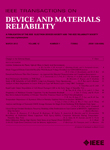
IEEE TRANSACTIONS ON DEVICE AND MATERIALS RELIABILITY
Scope & Guideline
Discovering Solutions: Enhancing Device Integrity Through Material Innovation.
Introduction
Aims and Scopes
- Device Reliability Assessment:
The journal emphasizes methodologies for assessing the reliability of various electronic devices, including semiconductors and integrated circuits, under different operational and environmental conditions. - Material Reliability and Aging:
Research on the aging mechanisms and reliability of materials used in electronic devices, including dielectrics, metals, and semiconductors, is a core focus. - Failure Mechanisms and Modeling:
The journal includes studies on identifying and modeling failure mechanisms in electronic devices, such as hot carrier degradation, time-dependent dielectric breakdown (TDDB), and thermal effects. - Innovative Reliability Enhancement Techniques:
Papers often present innovative techniques and technologies aimed at improving the reliability of devices, including design modifications and new material applications. - Impact of Environmental Factors:
Research exploring the impact of environmental factors such as radiation, temperature, and humidity on device reliability is a critical area of focus. - Advanced Testing and Characterization Methods:
The journal publishes work on new testing methods and characterization techniques that provide insights into the reliability and performance of devices.
Trending and Emerging
- Advanced Semiconductor Technologies:
There is a growing focus on the reliability of advanced semiconductor technologies, such as GaN and SiC devices, which are essential for high-performance applications. - Machine Learning and AI in Reliability Prediction:
The integration of machine learning and artificial intelligence for predictive modeling and reliability assessment is an emerging theme, reflecting the industry's shift towards data-driven approaches. - Flexible and Wearable Electronics:
Research on the reliability of flexible and wearable electronics is gaining traction, driven by the demand for innovative applications in consumer electronics and medical devices. - 3D Integration and Packaging Reliability:
As 3D integration techniques become more prevalent, studies addressing the reliability challenges associated with these advanced packaging methods are increasingly important. - Environmental and Radiation Effects:
Research examining the impact of environmental factors and radiation on device performance and reliability is trending, especially in applications related to space and military technologies. - Sustainability and Eco-Friendly Materials:
An emerging theme involves the exploration of sustainable and eco-friendly materials in device fabrication, focusing on their reliability and performance.
Declining or Waning
- Traditional Reliability Testing:
There has been a noticeable decrease in papers focused solely on traditional reliability testing methods, as newer and more sophisticated testing techniques gain prominence. - Basic Device Characterization:
Research centered on basic characterization of devices without a strong emphasis on reliability implications is less frequent, as the field moves towards more application-oriented studies. - Lower Technology Node Devices:
As the focus shifts towards advanced materials and devices, there is a decline in studies specifically targeting lower technology nodes, which were once a major area of interest. - Generalized Failure Analysis:
Papers providing generalized failure analysis without specific context or application to current technologies have become less common, as more targeted studies emerge.
Similar Journals
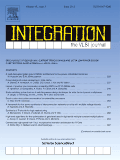
INTEGRATION-THE VLSI JOURNAL
Pioneering Insights in Very Large Scale IntegrationIntegration - The VLSI Journal, published by Elsevier, stands as a significant contributor to the fields of Electrical and Electronic Engineering, Hardware and Architecture, and Software. With its ISSN 0167-9260 and E-ISSN 1872-7522, this journal caters to a global audience interested in cutting-edge research and advancements in Very Large Scale Integration (VLSI) technologies and methodologies. As of 2023, the journal is classified in the Q3 category in its respective fields, demonstrating its commitment to quality and relevance in engineering. Researchers, practitioners, and students can benefit from its rigorous peer-review process, which ensures the publication of high-impact studies and innovative findings within the engineering landscape. Boasting a converged history from 1983 to 2025, Integration - The VLSI Journal continues to foster scholarly exchange and collaboration, making it an essential resource for anyone aiming to stay at the forefront of VLSI research.

Bridge Structures
Transforming Engineering Challenges into Bridge SuccessesBridge Structures is an esteemed academic journal dedicated to the field of structural engineering, particularly focusing on the design, analysis, and maintenance of bridge systems. Published by IOS PRESS, a reputable publisher known for its contributions to various scientific fields, the journal serves as an integral platform for disseminating innovative research and advancements within the domain. With an ISSN of 1573-2487 and an E-ISSN of 1744-8999, Bridge Structures has established itself over the years—covering contributions from 2005 to 2024. The journal has attained a commendable ranking within the Q3 category in Building and Construction and holds a position within the 28th percentile among its peers according to the Scopus rankings. Though the journal operates on a subscription basis, its commitment to advancing engineering knowledge is paramount, making it essential reading for researchers, practitioners, and students eager to deepen their understanding of bridge engineering. The journal not only explores theoretical advancements but also emphasizes practical applications, providing a well-rounded perspective on current challenges and solutions in the field of bridge structures.
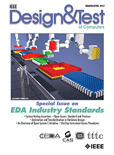
IEEE Design & Test
Transforming Challenges into Solutions in EngineeringIEEE Design & Test is a leading academic journal published by the IEEE-INST ELECTRICAL ELECTRONICS ENGINEERS INC, dedicated to advancing the fields of Electrical and Electronic Engineering, Hardware and Architecture, and Software. With an ISSN of 2168-2356 and an E-ISSN of 2168-2364, the journal spans from 2013 to 2024, offering valuable insights and peer-reviewed research that addresses critical challenges in the design, verification, and testing of electronic systems. Recognized for its quality, the journal holds a Q2 designation in Electrical and Electronic Engineering and ranks within the top quartiles of its category, making it a notable resource for professionals and scholars alike. Its Scopus rankings, particularly a rank of #354 in Electrical and Electronic Engineering, underscores its significance and relevance in the rapidly evolving technological landscape. Although not currently open access, the journal remains committed to disseminating innovative research that shapes the future of technology, ensuring that researchers and practitioners stay at the forefront of their disciplines. IEEE Design & Test serves as an essential platform for exchanging ideas, fostering collaboration, and driving advancements in engineering and computer science.
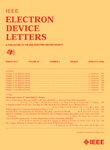
IEEE ELECTRON DEVICE LETTERS
Illuminating the Path of Electronic DiscoveriesIEEE Electronics Device Letters, published by the esteemed IEEE-Institute of Electrical and Electronics Engineers Inc, stands at the forefront of innovation in the field of electrical and electronic engineering. With a rich history spanning from 1980 to 2024, this journal showcases groundbreaking research and letters that significantly contribute to the advancement of electronic, optical, and magnetic materials. Its impressive Q1 rankings in both Electrical and Electronic Engineering and Electronic, Optical, and Magnetic Materials underscore its pivotal role in shaping contemporary academic discourse. The journal maintains a strong position in Scopus rankings, positioned within the top 16% for Electrical and Electronic Engineering and the top 18% for Materials Science, making it a vital resource for researchers, professionals, and students alike. With the absence of open access, it maintains an exclusive repository of high-impact research that experts in the field turn to for the latest insights and developments. IEEE Electronics Device Letters is committed to providing a platform for the dissemination of transformative knowledge that fuels innovation and progress in the ever-evolving landscape of electronics.
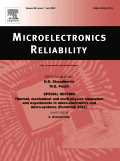
MICROELECTRONICS RELIABILITY
Commitment to Quality in Microelectronics ResearchMICROELECTRONICS RELIABILITY, published by PERGAMON-ELSEVIER SCIENCE LTD, is a pivotal journal that serves the advancing field of microelectronics and materials reliability. With its ISSN 0026-2714 and E-ISSN 1872-941X, this journal has been at the forefront of disseminating research since its inception in 1962 and is set to continue exploring cutting-edge topics through 2024. The journal holds a respectable presence across several categories, achieving a Q3 ranking in areas such as Atomic and Molecular Physics and Electrical and Electronic Engineering, highlighting its broad interdisciplinary appeal, while also ranking in the Q2 category for Safety, Risk, Reliability, and Quality, which speaks to its commitment to ensuring standards in technological advancements. Access to this journal is subscription-based, making it an essential resource for researchers, professionals, and students seeking reliable information and data regarding electronic material performance and reliability assessment. Located in Kidlington, Oxford, UK, MICROELECTRONICS RELIABILITY is dedicated to advancing the field and addressing the critical issues associated with the reliability of microelectronic devices, thereby supporting innovations that shape our technological future.
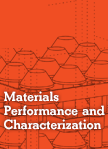
Materials Performance and Characterization
Fostering Excellence in Materials PerformanceMaterials Performance and Characterization is a distinguished journal published by the American Society for Testing and Materials (ASTM), specializing in the field of materials science. With ISSN 2379-1365 and E-ISSN 2165-3992, this journal serves as a pivotal platform for disseminating innovative research in the areas of metals and alloys, polymers and plastics, ceramics and composites, and mechanics of materials. Established in 2012, it continues to feature peer-reviewed articles that contribute to both theoretical advancements and practical applications, emphasizing the importance of materials performance in various industries. Despite its current Q4 and Q3 rankings across categories as of 2023, the journal is committed to enhancing its influence in the materials science community, fostering engagement among researchers, professionals, and students alike. The journal is essential for anyone seeking to stay at the forefront of materials research and characterization.
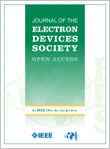
IEEE Journal of the Electron Devices Society
Unlocking Potential in Electron Device DiscoveriesIEEE Journal of the Electron Devices Society is a premier open-access publication dedicated to the advancement of knowledge in the field of electron devices. Published by the IEEE Institute of Electrical and Electronics Engineers Inc, this journal has been contributing essential research to the scientific community since 2013, reflecting its commitment to fostering innovation and development in the industry. With a notable impact factor that places it in reputable category quartiles—Q3 in Biotechnology and Q2 in both Electrical and Electronic Engineering and Electronic, Optical, and Magnetic Materials—this journal stands as a respected outlet for cutting-edge studies. Positioned among the top-ranked journals in its respective categories, including a Scopus rank of #90 in Electronic, Optical and Magnetic Materials, it serves as a vital resource for researchers, professionals, and students alike. The open-access model enhances the journal's accessibility, allowing for widespread dissemination of crucial findings and innovations in electron device technologies. Whether you are engaged in academia or industry, the IEEE Journal of the Electron Devices Society is essential for remaining at the forefront of advancements in this dynamic field.
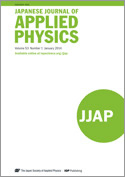
JAPANESE JOURNAL OF APPLIED PHYSICS
Shaping Tomorrow's Technology with Today’s InsightsThe Japanese Journal of Applied Physics is a premier publication in the field of applied physics, offering a platform for researchers and professionals to present their findings and innovations. Published by IOP Publishing Ltd, this esteemed journal has been active since 1963 and continues to contribute significantly to the understanding and advancement of applied physics across diverse applications. The journal is recognized for its rigorous peer-review process and high-quality publications, evidenced by its 2023 ranking of Q2 in Engineering (Miscellaneous) and Q3 in Physics and Astronomy (Miscellaneous). With an accessible ISSN of 0021-4922 and E-ISSN 1347-4065, the journal cultivates a global readership, fostering collaboration and innovation within the scientific community. Although the journal does not currently offer open access options, its valuable insights into the latest technological advancements and theoretical developments remain crucial for students, researchers, and industry professionals alike. By bridging the gap between fundamental physics and practical applications, the Japanese Journal of Applied Physics plays a vital role in shaping the future of applied sciences in Japan and beyond.
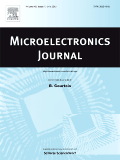
MICROELECTRONICS JOURNAL
Elevating the Standards of Microelectronics Research and DevelopmentMICROELECTRONICS JOURNAL, published by Elsevier Sci Ltd since 1974, serves as a pivotal platform for disseminating cutting-edge research in the realms of microelectronics, nanotechnology, and materials science. With editions spanning from 1974 to 2024, the journal is well-respected within the scientific community, boasting a strong presence in key categories such as Atomic and Molecular Physics, Condensed Matter Physics, and Electrical and Electronic Engineering, as evidenced by its Q3 ranking in 2023. Researchers and professionals engaged in the exploration of electronic materials, optical applications, and nanoscale innovations can greatly benefit from the journal's insights, which situate their work within a robust academic framework. Although the journal does not currently offer open access, its rigorous peer-review process and high visibility in Scopus rankings—including a percentile ranking of 58th in Condensed Matter Physics—make it an essential resource for anyone looking to stay at the forefront of advancements in microelectronics and related fields.
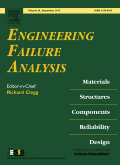
Engineering Failure Analysis
Elevating Engineering Standards Through AnalysisEngineering Failure Analysis is a prestigious peer-reviewed journal published by PERGAMON-ELSEVIER SCIENCE LTD, dedicated to advancing the field of engineering through comprehensive investigations into the causes and consequences of failures in various engineering domains. Established in 1994, the journal has become a cornerstone of knowledge in sectors such as Aerospace, Automotive, and Materials Science, earning its place within the Q1 quartile across multiple relevant categories in 2023. With a broad scope that encompasses topics related to safety, risk, reliability, and quality, it serves as a vital resource for researchers, professionals, and students keen on understanding how to mitigate failures and improve engineering practices. Although this journal does not currently offer Open Access, its impact is underscored by its high Scopus ranking, where it sits comfortably in the 36th position out of 307 in General Engineering. By bridging theoretical insights and practical applications, Engineering Failure Analysis plays a pivotal role in shaping the future of engineering standards and safety practices.